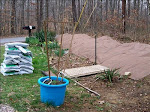 BIRDS AND BEES
BIRDS AND BEES I talked to the Tennessee Bee Inspector in our area yesterday. He is a veritable fount of information. He assures me there are bees in my area. He inquired about the kinds of flowers, herbs and veggies I was growing, whether I used pesticides (no), whether there was a tree line, all kinds of questions. He didn’t think it would be a good idea to keep bees here on our land because of the potential danger to my grandkids. He suggested I put hives on a friend’s farmland.
Among other things, we talked about colony collapse disorder. Not only are there mites to contend with, drought and warmer temps to withstand, but millions of bees are transported to different locations all over the U.S. to pollinate large crops. Recently in the news there was a story about a Canadian truck that overturned and released x million bees. The generation that comes after these transported bees are unable to find their way back to the hive.
http://www.thedailygreen.com/environmental-news/blogs/bees/colony-collapse-disorder-55063001
The Beekeeper’s Society meeting is once a month so I’ve got that on my schedule for August. The first of the month a bee expert instructs on what a beekeeper should do for the bees that month. They offer mentors, so although I can’t have a hive in my neighborhood, I can still learn from somebody who keeps bees in the area.
In the “bird” category, I called the city manager’s office and found that a chicken coop has to be 1000 yards from any dwelling. Our home is within the city limits, and our lots aren’t big enough to make that happen.
Among other things, we talked about colony collapse disorder. Not only are there mites to contend with, drought and warmer temps to withstand, but millions of bees are transported to different locations all over the U.S. to pollinate large crops. Recently in the news there was a story about a Canadian truck that overturned and released x million bees. The generation that comes after these transported bees are unable to find their way back to the hive.
http://www.thedailygreen.com/environmental-news/blogs/bees/colony-collapse-disorder-55063001
The Beekeeper’s Society meeting is once a month so I’ve got that on my schedule for August. The first of the month a bee expert instructs on what a beekeeper should do for the bees that month. They offer mentors, so although I can’t have a hive in my neighborhood, I can still learn from somebody who keeps bees in the area.
In the “bird” category, I called the city manager’s office and found that a chicken coop has to be 1000 yards from any dwelling. Our home is within the city limits, and our lots aren’t big enough to make that happen.
Planted: Blackberry brambles along the back property line. Successive plantings of okra, Alaska No-Wilt peas, lima beans, peppers, zinnias, marigolds, cockscomb, Black Magic elephant ears, and more cukes, zukes and squash in case this group fai ls.
ls.
Harvested: I dug up several blackberry brambles on the nearby construction site [with the builder’s permission]. Some are a little worse for wear; they bear the imprint of heavy machinery tires on their backs. I read that wild blackberries are more soil and drought tolerant, and they produce more and better-tasting berries. We’ll cover them with bird net next year when the berries come in.
We harvested tomatoes and beans for Monday night dinner. Spotted cat’s eye for salad. Our water catch system is working well. In the past week we harvested more than 110 gallons of rainwater. Picked green beans and steamed them.
Prepped: Pre-ordered Sharon’s book! Cleaned out a crock to use for blackberry brandy. Hub built some a garden bed with lumber we got from the construction site. I ordered heirloom seed from Southern Seed Exchange: long-standing spinach, Buttercrunch lettuce, Deer Tongue lettuce, Yugoslavian Red Butterhead lettuce, Red Russian kale, Georgia Green collards, Red Giant mustard greens. The names alone sound good enough to eat. We’re going to plant tiny amounts of each for fall greens and save the remaining seeds for spring. I read that you keep the seeds in a jar or airtight container with an oxygen absorber out of light. Not in the refrigerator!
the refrigerator!
Stored: Scavenged more lumber from the construction site before they took the rest away to the landfill. Stored various canned goods, shelf stable milk, and more water. I was disappointed that my coop order from Breakbeckers isn’t coming in until July 30th. Still, lots of veggies are in season, and our own plants are beginning to put out.
I started a brandied fruit crock. When we got the gorgeous blackberries from Delvin Farms, I put them in the crock, covered the fruit with sugar, and about an hour later I covered the whole thing with brandy.
Managed: I started pollinating the pumpkins, squash, cantaloupe and cukes. I used a tiny artist’s brush. I’m finding that most of the blooms on the pumpkin are male, which explains why all the blooms drop. The high heat is also a factor. The following link gives a brief explanation and instructions on pollinating plants yourself. http://faq.gardenweb.com/faq/lists/cornucop/2000073258013975.html
This week we turned out the compost bin into a larger space, added string for beans to grow up to reach the lattice on our deck, st arted digging a hole for the apple tree. Cut and raked grass for the compost heap.
arted digging a hole for the apple tree. Cut and raked grass for the compost heap.
Recycled/Reused: We composted and recycled as usual. Shredded lots of white paper to use in the composter. Scavenged the construction site. We bought grapes and they went bad fast, so I spread them out for the butterflies.
 ls.
ls.Harvested: I dug up several blackberry brambles on the nearby construction site [with the builder’s permission]. Some are a little worse for wear; they bear the imprint of heavy machinery tires on their backs. I read that wild blackberries are more soil and drought tolerant, and they produce more and better-tasting berries. We’ll cover them with bird net next year when the berries come in.
We harvested tomatoes and beans for Monday night dinner. Spotted cat’s eye for salad. Our water catch system is working well. In the past week we harvested more than 110 gallons of rainwater. Picked green beans and steamed them.
Prepped: Pre-ordered Sharon’s book! Cleaned out a crock to use for blackberry brandy. Hub built some a garden bed with lumber we got from the construction site. I ordered heirloom seed from Southern Seed Exchange: long-standing spinach, Buttercrunch lettuce, Deer Tongue lettuce, Yugoslavian Red Butterhead lettuce, Red Russian kale, Georgia Green collards, Red Giant mustard greens. The names alone sound good enough to eat. We’re going to plant tiny amounts of each for fall greens and save the remaining seeds for spring. I read that you keep the seeds in a jar or airtight container with an oxygen absorber out of light. Not in
 the refrigerator!
the refrigerator!Stored: Scavenged more lumber from the construction site before they took the rest away to the landfill. Stored various canned goods, shelf stable milk, and more water. I was disappointed that my coop order from Breakbeckers isn’t coming in until July 30th. Still, lots of veggies are in season, and our own plants are beginning to put out.
I started a brandied fruit crock. When we got the gorgeous blackberries from Delvin Farms, I put them in the crock, covered the fruit with sugar, and about an hour later I covered the whole thing with brandy.
Managed: I started pollinating the pumpkins, squash, cantaloupe and cukes. I used a tiny artist’s brush. I’m finding that most of the blooms on the pumpkin are male, which explains why all the blooms drop. The high heat is also a factor. The following link gives a brief explanation and instructions on pollinating plants yourself. http://faq.gardenweb.com/faq/lists/cornucop/2000073258013975.html
This week we turned out the compost bin into a larger space, added string for beans to grow up to reach the lattice on our deck, st
 arted digging a hole for the apple tree. Cut and raked grass for the compost heap.
arted digging a hole for the apple tree. Cut and raked grass for the compost heap.Recycled/Reused: We composted and recycled as usual. Shredded lots of white paper to use in the composter. Scavenged the construction site. We bought grapes and they went bad fast, so I spread them out for the butterflies.
Learn Something New: Bees get up earlier than I do. After the recent rainfall here we had a crop of sunflowers that bloomed. Suddenly our yard is filled with honey bees.
Local: Our collective neighbors tell us they have NO desire to garden. They want nice smooth lawns, every house uniform.
We bought produce from Delvin Farms, a local organic farm. The blackberries were huge…only half of them made it into the brandy crock.

















